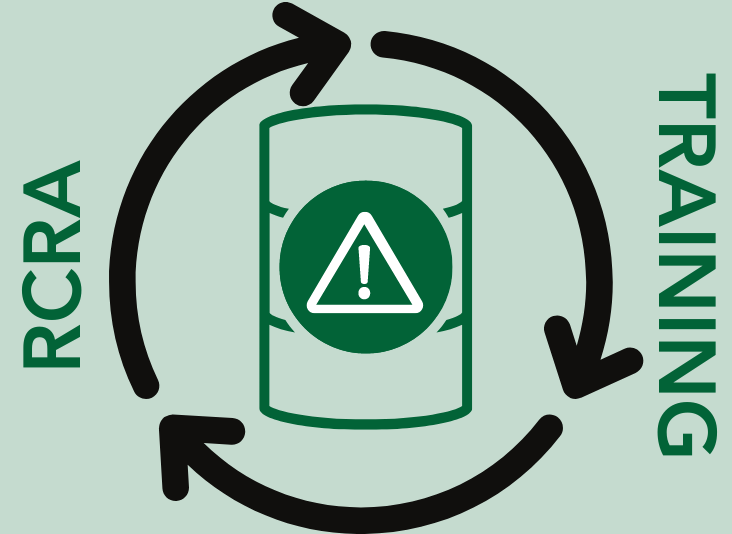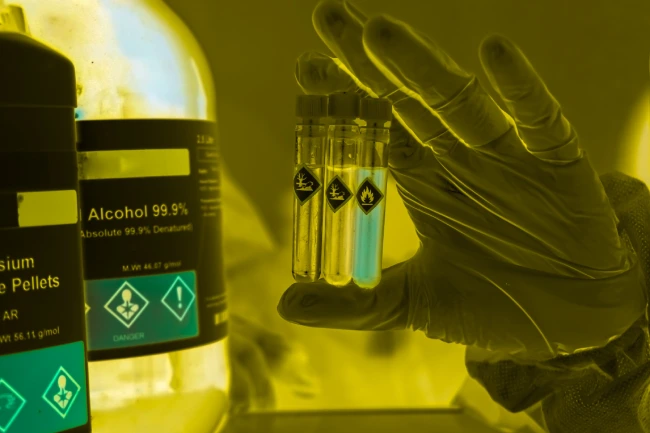RCRA Training Requirements: A Comprehensive Overview
Resource Conservation and Recovery Act (RCRA), passed in 1976, led to a baseline set of hazardous waste regulations—including a RCRA training requirement for hazardous waste generators that can vary state-to-state and based on generator status.
What Is RCRA and Why Does It Matter for Waste Generators?
RCRA is the Resource Conservation and Recovery Act. It is the United States’ primary law governing the disposal of solid and hazardous waste. The US Congress passed RCRA on October 21, 1976 to address increasing problems from the growing volume of municipal and industrial waste. RCRA, which amended the Solid Waste Disposal Act of 1965, set national goals for:
- Protecting human health and the environment from the potential hazards of waste disposal
- Conserving energy and natural resources
- Reducing the amount of waste generated
- Ensuring wastes are managed in an environmentally-sound manner.
Basically, RCRA is the United States’ hazardous waste law, out of which came the regulations governing the generation, transportation, treatment, storage, and disposal of hazardous waste. “RCRA” can also often be used as a reference to any topic related to hazardous waste—like RCRA training requirements, RCRA regulations, RCRA compliance, RCRA inspections, and more.
What Is RCRA Hazardous Waste?
The United States Environmental Protection Agency (EPA) regulates the generation, transportation, treatment, and disposal of hazardous (RCRA) wastes, and as such gives us the technical definition of a RCRA hazardous waste in 40 CFR 261.3. However, it goes on for ten paragraphs and it’s in a language that doesn’t even seem English, full of references and cross references and exclusions, and well, let’s approach this question from another way and let the lawyers deal with that definition. . . since they wrote it!
A simpler, paraphrased version is: “A "RCRA hazardous waste" is any waste or combination of wastes of a solid, liquid, contained gaseous, or semi-solid form that, because of its quantity, concentration, or physical or chemical characteristics, may cause or significantly contribute to an increase in mortality or an increase in serious irreversible or incapacitating reversible illness; or pose a substantial present or potential hazard to human health or the environment.”
Boiling it down further, RCRA hazardous wastes are certain chemical wastes that are regulated due to their human toxicity and/or possible negative impacts to the environment or human health if improperly managed.
Getting even simpler, a waste is a RCRA hazardous waste if the EPA says it is. The EPA has identified hundreds of wastes that meet the hazardous waste definition, each of which are identified with an EPA waste number or “waste code”. Each waste code has a very specific definition based upon factors such as constituents, properties, and/or the process that generated the waste. If a waste matches the definition of one or more waste codes, then it’s considered a hazardous waste.
In authorized state RCRA programs (which exist in 48 out of 50 states), the state environmental authority may also expand the umbrella of RCRA hazardous waste to include additional wastes considered hazardous waste within that state.
RCRA Training Requirements By Generator Status
LQG vs. SQG vs. VSQG? That’s a complicated one. State-authorized RCRA programs may have their own definitions for the different generator statuses. Making this determination is very important since it, in part, determines what regulations are applicable to an organization.
The chart below shows how a site’s federal generator status is determined based upon monthly generation amounts and total onsite accumulation amounts. Notice the reference to “acute hazardous waste;” acute hazardous wastes include wastes with a P-waste code and six F-listed dioxin-bearing wastes.

State programs may use different definitions or even different terms to signify generator status.
Some of those variations include:
- Combining large and small quantity generators into one category, effectively requiring small generators to comply with large quantity requirements
- Renaming categories
- Altering the definitions of each category
- Including additional state regulated hazardous wastes as part of the definitions
- And more
So, when determining generator status, a generator must first determine their federal size (which doesn’t go away), and then make alterations if warranted by state regulations.
What Are The RCRA Training Requirements for Hazardous Waste?
RCRA training is, quite simply, imparting knowledge regarding the hazardous waste regulations to employees of a regulated entity, including generators of hazardous waste. RCRA training requirements include relevance to the hazardous waste-related duties of the employees in order to provide them the best opportunity to be in compliance with the regulations at any given time. An effective training program helps people not only protect the environment, but also to hopefully survive a regulatory inspection unscathed.
There are two different specific RCRA training requirements for employees who have RCRA-related responsibilities, the applicability of which depends upon the site’s generator status and what state they’re located in:
LQG Training Requirements:
In the federal EPA RCRA training requirements, the standard is only applicable to large quantity generators, although that may differ from state to state. Some state programs make this standard applicable to smaller generators as well.
LQG RCRA training requirements are very specific and addresses common issues, including:
- Successful training completion
- Curriculum-based upon the RCRA duties of the employees
- Acceptable modes of delivery (e.g., live, computer based, etc)
- Qualifications of the person directing the training
- Timeframe for training of new employees
- Emergency response responsibilities
- An annual recurrence requirement
- Five recordkeeping requirements
Some states may add additional provisions, such as requiring a written training plan or adding specific curriculum.
SQG Training Requirements:
The federal RCRA training requirements for small quantity generators is very broad and consists of only one sentence:
“The small quantity generator must ensure that all employees are thoroughly familiar with proper waste handling and emergency procedures, relevant to their responsibilities during normal facility operations and emergencies.”
VSQG Training Requirements:
There are no RCRA training requirements for very small quantity generators in the federal RCRA training requirements. Individual states may impose RCRA training requirements.
Who Needs RCRA Hazardous Waste Training?
Any employee who has RCRA-related responsibilities has a RCRA training requirement. This includes those involved in the generation, transportation, treatment, handling, storage, or disposal of RCRA-listed hazardous waste needs RCRA hazardous waste training, like employees whose job functions include and of the following activities:
- Assessing waste contracts and liability issues
- Performing waste determinations, applying waste codes, and authorizing profiles
- Managing universal waste
- Determining generator status
- Filing notifications
- Signing hazardous waste manifests
- Signing land disposal restrictions notices
- Filing biennial/annual reports
- Delivering training
- Performing weekly/daily inspections
- Developing/maintaining contingency plans and emergency posting
- Maintaining emergency equipment
- Maintaining central accumulation areas (CAAs) and/or satellite accumulation areas (SAAs)
- Maintaining containers (closure, condition, compatability)
- Maintaining tank systems
- Labeling and makring of containers and tanks
- Developing or maintaining waste minimization plans or initiatives
- Maintaining records
- Overseeing any of the aforementioned activities
State-Specific RCRA Training Requirements Explained
Only two states in the US, Alaska and Iowa, do not have authorized RCRA programs. The EPA administers the hazardous waste program in those states and therefore the federal training requirements apply for large and small quantity generators. In all the other 48 states, training is required as found in the state’s hazardous waste regulations; the applicability and specifics of those requirements can vary state-to-state.
States May Alter Federal RCRA Hazardous Waste Training Requirements
The next important factor to determine specific RCRA hazardous waste training requirements is: Did the state change the language of the federal RCRA training requirements? States may revise these in a number of ways:
- Requiring a written training plan, as in Massachusetts
- Adding specific training curriculum and additional documentation, like in Rhode Island
- Increasing the necessary qualifications of the training director, as Rhode Island also does
- Clarifying training requirements for satellite accumulation areas (SAAs), like in Vermont
What Are the Baseline EPA RCRA Hazardous Waste Training Requirements?
Generators in all US states must comply with minimum baseline RCRA training requirements. 48 out of 50 states, however, excluding Alaska and Iowa, have approved state RCRA programs—which means those states’ own environmental departments enforce their own RCRA regulations. The totality of any state RCRA program is at least as stringent as the federal requirements.
Some states, like New Jersey and Pennsylvania, mimic or almost mimic the federal regulations; others revise and/or add to the federal rules. Among the states that alter the federal rules, some do so in limited or subtle ways, others in dramatic and far-reaching ways (can you say, “California”?).
Any state’s specific RCRA hazardous waste training requirement is no different than the program itself in that it may be the same as, or it may be stricter than, the EPA’s requirements.
The factors that affect which training requirements apply to your site include:
- What state you’re in
- Your federal generator status
- Your state generator status, if different
- How the federal training requirements apply to your generator status
- If your state altered the federal training requirements
How Often RCRA Training Is Required and Enforced
RCRA hazardous waste training is required when organizations store, handle, dispose of, transport, treat, or generate RCRA hazardous waste.
Is RCRA Training Required Annually?
How often is RCRA training required? For Large Quantity Generators (by the federal definition), it’s required annually. For other generator sizes, this can vary based on the organization’s state.
Can You Take RCRA Training Online?
Yes. A popular option is to participate in a live instructor-led session. In doing so, you’re more likely to have the opportunity to ask questions, get clarification, and dive into how requirements apply to your specific operation.
How Long Is RCRA Training Good For?
RCRA training is good for one year if the generator falls under the “LQG Training Standard”. If the generator does not fall under that standard, the training does not expire. In a state-authorized RCRA program, the generator needs to check if the LQG training standard applies to smaller generators as well, which is not unusual.
How Often is RCRA Training Required for a Large Quantity Generator?
RCRA training is required annually for large quantity generators.
Baseline RCRA Training Requirements By Federal Generator Designation
Among other factors, baseline RCRA training requirements will differ by federal generator designation. Let's explore this:
Large Quantity Generators (LQGs):
LQG federal RCRA hazardous waste training requirements state that employers must:
- Teach employees:
- How to perform their duties in a way that ensures compliance
- How to respond effectively to emergencies
- Be relevant to the position in which a worker is employed
- Be directed by a person trained in hazardous waste management procedures
- Occur within six months of start for a new employee
- Include an annual review of the initial required training that all personnel must take part in
- Maintain training records that document that the training has been completed. These records must be retained until the facility closes and at least 3 years from when the employee last worked at the facility. Training records must include:
- Employee name and job title related to hazardous waste management
- A written job description
- A written description of the type and amount of training
- Documentation that the training has been completed
Small Quantity Generators (SQGs):
SQG federal RCRA hazardous waste training requirements simply state that:
The training must be relevant to the position in which a worker is employed and must teach them:
- How to perform their duties in a way that ensures compliance
- How to respond effectively to emergencies
Very Small Quantity Generators (VSQGs):
VSQGs do not have a federal RCRA hazardous waste training requirement, but may be required by a state-specific program.
Applicability of LQG vs. SQG RCRA Hazardous Waste Training Requirements
The first variable that may change between federal and state-authorized RCRA programs depends on if the state extends the federal LQG training requirements to smaller generators, as is the case in New Hampshire and Maryland. In such instances, the state redefines generator status and creates a name that encompasses federal LQGs and SQGs (and in some cases, even VSQGs) under one umbrella. This term may be “Full Quantity Generator,” “Fully-Regulated Generator,” or the like.
Another variation of this—certain states (again, can you say “California!”) extend federal SQG training requirements to VSQGs. It is crucial that one assigns the proper generator size to each individual site based upon the state definitions.
Who Can Give RCRA Training?
Under the LQG RCRA training requirements, a RCRA training program must be directed by a person trained in hazardous waste management procedures. For smaller generators, there is no trainer or training director qualification requirements.
Do Universities Need RCRA Training?
Universities typically generate a wide variety of hazardous wastes produced from departments such as facilities maintenance, research and academic laboratories, chemistry, health clinics, and other departments as diverse as Art and Engineering. Where there’s hazardous waste activities going on, there are employees and even students who need to be trained. Not only do people handling hazardous waste need to be trained, but also those responsible for managing the hazardous program on behalf of the university—typically EHS staff.
Are RCRA Training Rules Still Enforced?
All hazardous waste regulations, including the RCRA training requirements, can be enforced by the EPA. In states that have an authorized RCRA program, hazardous waste regulations may also be enforced by the state environmental department. In rare cases, a county or municipal government may also be authorized to perform enforcement activities (e.g., Certified Unified Program Agencies in California).
Tips to Make RCRA Hazardous Waste Training More Engaging
There are four ways to make the potentially boring topic of RCRA hazardous waste training less so:
- Give perspective. Show people why they are involved in the RCRA hazardous waste training, why the RCRA hazardous waste training matters, and the real-life consequences of noncompliance.
- Force the audience to think. Ask engaging questions, host trivia, and offer discussion prompts about RCRA hazardous waste challenges and solutions.
- Get hands-on. Show and tell old hazardous wastes to put the real-life applicability into the “classroom” training setting.
- Have the right attitude. An excited trainer can help increase audience excitement and thus, participation.
Ultimately, running a successful RCRA hazardous waste training program can be challenging. Turning to a trusted partner can help ensure relevant, accurate, interactive, and engaging training for your teams.
Get Local RCRA Training That Meets State Requirements
Triumvirate Environmental is here to help. Our EHSLearn™: Seminars training program provides RCRA training for 19 US states. Our dedicated team and experienced instructors have in-depth knowledge of the regulations—including relevant state-specific requirements. —This can cut through the confusion to get you exactly what you need.
Our RCRA Hazardous Waste Training Formats
- Live virtual training sessions with an experienced trainer
- Onsite RCRA hazardous waste training at your company location
Register for a RCRA course today or contact us to learn more.






.png)

